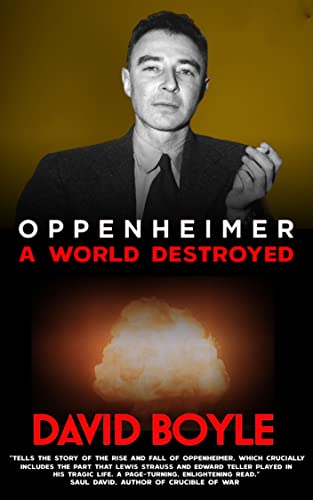
"Tells the story of the rise and fall of Oppenheimer, which crucially includes the part that Lewis Strauss and Edward Teller played in his tragic life. A page-turning, enlightening read." Saul David, author of Crucible of War. 16 July 1945. The very first nuclear explosion in history takes place in the American desert in New Mexico. It is the culmination of the biggest and most expensive military project of any of the warring powers, and it attracted scientists from all over the world. Nobody who saw it ever forgot the moment. “Now I am become Death, the destroyer of worlds,” said Robert Oppenheimer, after having seen the incredibly bright light and felt the heat from the explosion from 10,000 yards away. ‘Oppie’ had been plucked from relative obscurity, at the age of only 38, to take charge of the top-secret Los Alamos laboratory, where the main thinking behind the invention of the A-bomb took place. There, he had led a team of scientists from all over Europe and the Americas, desperately working against the clock to develop the Bomb before Hitler did. Those who remained when Hitler was dead – including Oppie – felt huge guilt that it had been used against Hiroshima and Nagasaki without any warning. After the war, Oppenheimer faced a campaign against him led by Lewis Strauss, the chair of the Atomic Energy Commission. Strauss conceived a great animus against Oppie, which continued throughout his life. He forced Oppenheimer to take part in a hearing lasting three weeks, to answer charges that he was a communist and Soviet spy - and which removed his security status and virtually exiled him in his own country. Among those who gave evidence against him was his former friend Edward Teller, the father of the H-bomb. His evidence set scientist against scientist, and helped ratchet up a global arms race. After 1945, Oppenheimer had become a well-known figure around Washington. pressing for openness about the weapon he had created – desperately trying to avoid the nuclear arms race he believed would destroy civilisation. But these were seriously dark days in the USA. Joe McCarthy was at the height of his power – and anyone who stepped out of line was suspect. As Oppenheimer discovered to his cost... David Boyle is a British author and journalist who writes mainly about history and new ideas in economics, money, business and culture. He lives in Crystal Palace, London. His books include ‘Unheard Warfare in the Dardanelles’, ‘Towards the Setting The Race for America’ and ‘The Age to Come’. He is also the author of the Caractacus series and the Geniuses series. Praise for David ‘Exhilarating.’ Daily Mail. ‘The struggle against oppression had me rooting for Caractacus.’ Alistair Forrest, author of Libertas. 'A wonderfully elegant and pithy reappraisal of the “miracle” that saved Britain.' Saul David.
Author
David Boyle is the author of Blondel’s Song: The Capture, Imprisonment and Ransom of Richard the Lionheart, and a series of books about history, social change and the future. His book Authenticity: Brands, Fakes, Spin and the Lust for Real Life helped put the search for authenticity on the agenda as a social phenomenon. The Tyranny of Numbers and The Sum of Our Discontent predicted the backlash against the government’s target culture. Funny Money launched the time banks movement in the UK. David is an associate of the new economics foundation, the pioneering think-tank in London, and has been at the heart of the effort to introduce time banks to Britain as a critical element of public service reform - since when the movement has grown to more than 100 projects in the UK. He is also the founder of the London Time Bank network and co-founder of Time Banks UK. He writes about the future of volunteering, cities and business. His work on the future of money has also been covered in books and pamphlets like Why London Needs its own Currency (nef, 2000), Virtual Currencies (Financial Times, 2000), The Money Changers: Currency reform from Aristotle to e-cash (Earthscan, 2002) and The Little Money Book (Alastair Sawday, 2003). He has written for many national newspapers and magazines, and edited a range of magazines including Town & Country Planning and Liberal Democrat News. He is the editor of Radical Economics. He lives in Crystal Palace, in south London, with Sarah and Robin (two years old). He is a member of the Federal Policy Committee of the Liberal Democrats and he stood for Parliament in Regents Park and Kensington North in 2001.